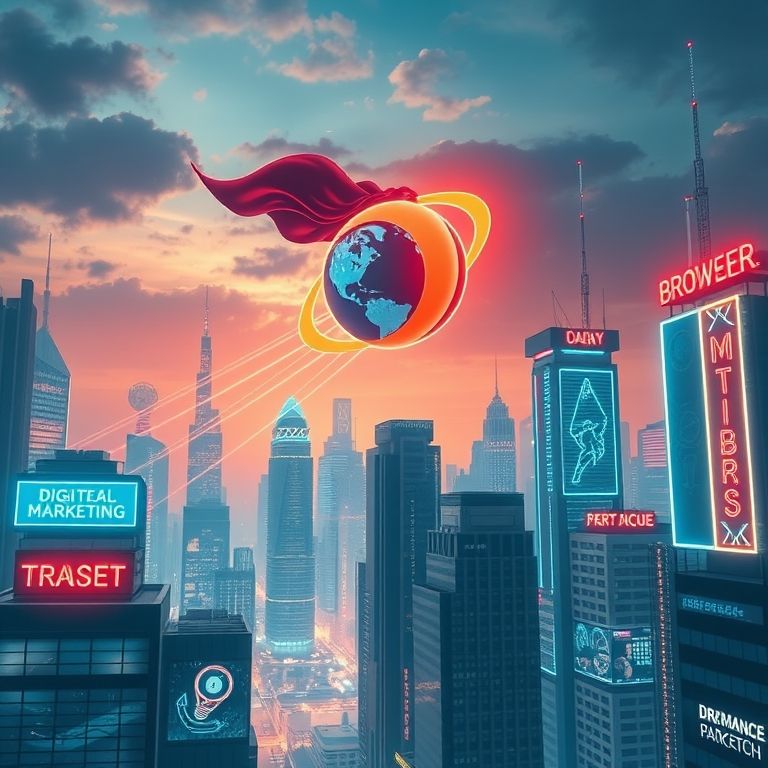Hey everyone,
Just finished reading a fascinating piece on Search Engine Journal – “How Agentic Browsers Will Change Digital Marketing” by Duane Forrester. It got me thinking about the real implications of AI-powered browsers for how we reach and connect with people online. Microsoft, Google, and OpenAI are pushing this agentic technology forward, and it’s time we, as marketers, start paying close attention.
Think of it this way: instead of passively searching, people will be asking their browsers to do things for them. “Find the best deals on flights to Douala next month,” or “Research the top-rated mobile money providers in Cameroon.” These agentic browsers become proactive assistants, sifting through the noise and delivering personalized results.
Forrester’s article highlights that this shift means a move from search-mediated discovery to machine-mediated discovery. We’re talking about a future where algorithms increasingly influence the customer journey, potentially bypassing traditional search engine results pages (SERPs) altogether.
Why should we care? Because the way we optimize our content, run our ads, and build our brands needs to adapt. Here’s what’s swirling around in my head:
- SEO is evolving, not disappearing: While traditional keyword rankings might become less critical, optimizing for intent becomes even more crucial. Understanding the specific needs and desires behind user queries will be key to getting your content in front of the right agent. According to a recent study by Backlinko, optimizing for user intent can increase organic traffic by 60%.
- Content needs to be truly helpful: Agentic browsers will prioritize content that directly addresses the user’s needs. Generic marketing fluff simply won’t cut it. We need to create resources that are informative, insightful, and actionable. Think comprehensive guides, detailed product reviews, and solutions-focused articles. Nielsen Norman Group reports that users spend 50% less time on websites with poor usability.
- Personalization is paramount: Delivering targeted experiences will be more important than ever. Understanding customer preferences and tailoring content to individual needs will be crucial for capturing the attention of agentic browsers. A McKinsey report states that personalization can deliver five to eight times ROI on marketing spend.
- Trust and authority matter: Agentic browsers will likely rely on signals of trust and authority to filter information. Building a strong brand reputation, earning positive reviews, and establishing yourself as an expert in your field will be crucial. BrightLocal’s research consistently shows that positive online reviews significantly impact consumer trust.
- New advertising avenues are emerging: As agentic browsers become more sophisticated, we might see new advertising models emerge. Imagine ads that are seamlessly integrated into the agent’s recommendations, providing relevant solutions to user needs. These could be native ads on steroids! Statista projects that native advertising spend will reach $402 billion by 2025.
5 Takeaways to Think About:
- Focus on Intent: Deeply understand the “why” behind user queries.
- Create Value: Offer truly helpful and informative content.
- Personalize Everything: Tailor experiences to individual needs.
- Build Trust: Establish your authority and earn positive reviews.
- Experiment with New Ad Formats: Explore how to reach users through agentic browsers.
This agentic shift is exciting, and perhaps a little daunting, but it’s an opportunity to become more customer-centric than ever before.
FAQ: Agentic Browsers and Digital Marketing
- What exactly is an agentic browser? An agentic browser is an AI-powered tool that proactively assists users in completing tasks and finding information, going beyond simple search functionality.
- How are agentic browsers different from regular search engines? Unlike traditional search engines that require users to manually search for information, agentic browsers use AI to understand user intent and proactively provide solutions.
- Will agentic browsers replace search engines? It’s unlikely they will completely replace search engines, but they will significantly change how people find information and interact with the web.
- How can businesses prepare for the rise of agentic browsers? By focusing on understanding user intent, creating high-quality content, building trust, and experimenting with new advertising formats.
- What role will SEO play in the age of agentic browsers? SEO will evolve to focus more on optimizing for user intent and providing valuable, informative content.
- How important will personalization be in agentic browser marketing? Personalization will be crucial as agentic browsers prioritize delivering targeted experiences tailored to individual user needs.
- Will paid advertising still be effective with agentic browsers? Yes, but advertising strategies will need to adapt to the new landscape, potentially involving more native and integrated ad formats.
- How will agentic browsers impact small businesses? Small businesses can leverage agentic browsers to reach niche audiences and build stronger relationships with customers by providing personalized and helpful solutions.
- What are the potential ethical concerns with agentic browsers? Concerns include data privacy, algorithmic bias, and the potential for manipulation of user choices.
- Where can I learn more about agentic browsers and their impact on digital marketing? Follow industry publications like Search Engine Journal, attend digital marketing conferences, and stay updated on the latest AI and browser technology trends.






